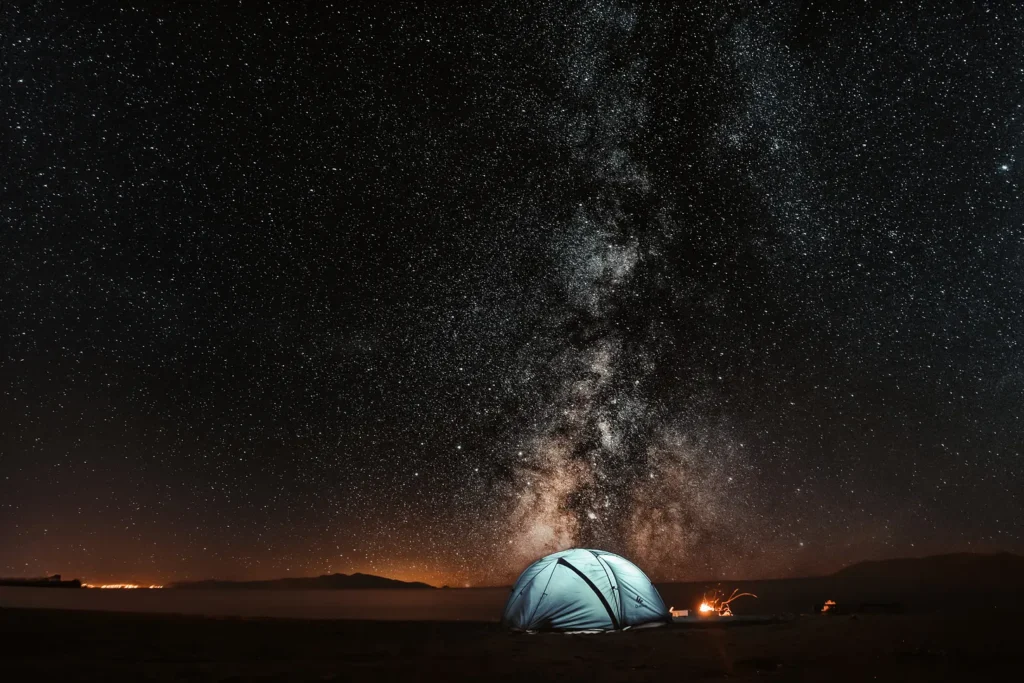Learning from Jacob’s dreamy encounter.
At the beginning of this week’s Torah portion, Vayetze, Jacob is on the move. He’s on the road when he “encounters” a place and decides to stay overnight. This moment, already narratively suspect, leaves Jacob with a dream, having fallen asleep on a rock. A ladder set into the ground reaching all the way to the sky, with angels going up and down. This fantastic moment, followed by a robust promise from God, leaves Jacob nearly speechless. He says:
וַיִּיקַ֣ץ יַעֲקֹב֮ מִשְּׁנָתוֹ֒ וַיֹּ֕אמֶר אָכֵן֙ יֵ֣שׁ ה׳ בַּמָּק֖וֹם הַזֶּ֑ה וְאָנֹכִ֖י לֹ֥א יָדָֽעְתִּי׃ וַיִּירָא֙ וַיֹּאמַ֔ר מַה־נּוֹרָ֖א הַמָּק֣וֹם הַזֶּ֑ה אֵ֣ין זֶ֗ה כִּ֚י אִם־בֵּ֣ית אֱלֹהִ֔ים וְזֶ֖ה שַׁ֥עַר הַשָּׁמָֽיִם׃
Jacob awoke from his sleep and said, “Surely the LORD is present in this place, and I did not know it!” Afraid [or shaken], he said, “How awesome is this place! This is none other than the abode of God, and that is the gateway to heaven.”
Jacob wakes up and exclaims! The Divine is right here and I did not know it!

Let’s unpack that for a moment.
First, Jacob says, “I did not know it!” expressing surprise and God’s unique presence in that particular location. Rashi tells us that had Jacob known, he would not have slept in that location. Sforno explains that Jacob would have prepared himself mentally for the prophecy.
While I don’t think these two explanations are necessarily in conflict with one another, we might have to ask a more fundamental question: how would he have known? What could Jacob have done differently?
Second, Jacob becomes afraid. The root of the word ירא carries a sense of fear or awe. I kept the slightly inaccurate translation of “shaken” because I think it captures something very deep about this moment. Jacob has this profoundly serious spiritual experience and is now reflecting on the implications. He wakes up, exclaims, and then in his moment of reflection, begins to tremble.
This little vignette offers us a few important takeaways.
Perspective is everything.
Jacob, reasonably, could not have known about the uniqueness of the place in which he slept. The hint is there in the Torah for us to see, but Jacob, I think, could never have known. A few verses before we’re told, as I hinted above, “וַיִּפְגַּ֨ע בַּמָּק֜וֹם” meaning, “[Jacob] encountered the place.” But Jacob is not the narrator of our story and couldn’t know.
How often has that been true in our lives? How often has our limited, human perspective stopped us from seeing what is obvious? The answer is all the time. We can only experience life through our own ability to perceive.
This can be a reminder that there is more happening around us than we notice. And I don’t just mean the dishes piling up in the sink. By constantly striving to broaden our perspective, we can get a more full picture of the universe. I recently read this fantastic article about Earth’s location in the cosmos. We have just learned that Earth is closer to the center of our galaxy by 2000 light-years. The scientists used a system of telescopes to calculate our location. Not one telescope, but a network.
Namely, by expanding our perspectives, small and large, we can see a fuller picture of the universe. That’s not an exaggeration.
Learn from every moment.
Both Rashi and Sforno’s responses to Jacob’s exclamation are fundamentally about questions about ourselves. How would I have reacted with the new information I now have? We ask these questions all the time, but it is important to understand the purpose of this question.
If we take it at face value, we should be ashamed. This was more important than I realized and I did not act appropriately. How could Jacob sleep in such a holy place!? Why wasn’t Jacob more spiritually prepared?!
Rather, I think the question should be understood, what can I do differently next time?
In the famous burning bush moment, Moses is not prepared either. We can never go back and become more prepared. We can’t go back in time and change who we were. All we can do is learn from the moment and do something different next time.
That is why it is so important to learn from everything and everyone. As it says in Pirkei Avot:
“Ben Zoma said: who is wise? The one who learns from every person.”
Fear and awe are reminders to pay attention.
As Jacob reels from his prophetic moment, he is overcome with awe and fear. In some sense, this is likely a manifestation of our primal instinctual response to “fight or flight.”
These inflection points are a reminder for us to pay attention to what is happening. For many of us, this response is not a reflection of a predatory animal stalking us in the woods, but conflicts and extreme moments in our day or life. Each of these sharpens our focus at that moment and should encourage us to reflect when it is over.
In the verse, it uses the word אכן, which is one of those Hebrew words that don’t really translate. Rashbam explains:
“All uses of [this word] in Scripture [mean] “this is not what I thought” and similarly [to express] “that this thing is known!”
Jacob, in this moment, full of fear and awe, realizes that not everything is as it seems. He reflects and understands the impact of this moment. He recognizes that something important has happened to him.
We are facing a new world, every day.
The Tradition teaches that every day God is co-creating the universe again with us. As we face it with awe, it behooves us to recognize our limited perspective and learn from every moment, paying attention to the details.